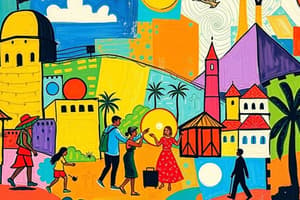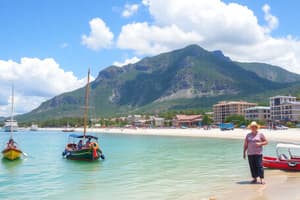Podcast
Questions and Answers
What type of tourism is focused on experiencing local culture and heritage?
What type of tourism is focused on experiencing local culture and heritage?
- Cultural Tourism (correct)
- Leisure Tourism
- Adventure Tourism
- Medical Tourism
Adventure tourism does not involve physical activities.
Adventure tourism does not involve physical activities.
False (B)
Name one trend currently impacting the tourism industry.
Name one trend currently impacting the tourism industry.
Eco-tourism or digital nomadism or experiential travel.
Traveling for professional purposes is referred to as __________ tourism.
Traveling for professional purposes is referred to as __________ tourism.
Match the types of tourism with their corresponding characteristics:
Match the types of tourism with their corresponding characteristics:
Flashcards are hidden until you start studying
Study Notes
Definition of Tourism
- Tourism involves travel for leisure, business, or recreation.
- Can be domestic (within one's own country) or international (to another country).
Types of Tourism
-
Leisure Tourism
- Travel for relaxation, recreation, and enjoyment.
- Examples: beach vacations, city tours.
-
Cultural Tourism
- Focused on experiencing and engaging with local culture.
- Examples: museums, heritage sites, festivals.
-
Adventure Tourism
- Involves physical activities and exploration.
- Examples: hiking, rock climbing, eco-tours.
-
Medical Tourism
- Traveling for medical care and procedures.
- Examples: surgeries, wellness retreats.
-
Business Tourism
- Travel for professional purposes, including meetings and conferences.
Economic Impact
- Generates significant revenue for many countries.
- Creates jobs in various sectors: hospitality, transport, and entertainment.
- Can lead to infrastructure development (roads, airports).
Environmental Considerations
- Potential negative impacts: pollution, habitat destruction, and resource depletion.
- Sustainable tourism promotes conservation and minimizes ecological footprints.
Social and Cultural Impact
- Can lead to cultural exchange and understanding.
- Risks of cultural commodification and loss of authenticity.
- May affect local communities and lifestyles.
Key Players in the Tourism Industry
- Travel agencies and tour operators.
- Hotels, airlines, and transportation providers.
- Government tourism boards and organizations.
Trends in Tourism
- Rise of eco-tourism and sustainable practices.
- Increasing popularity of digital nomadism (location-independent work).
- Growth of experiential travel (unique experiences over material goods).
- Use of technology and online platforms for booking and travel planning.
Challenges Facing the Tourism Industry
- Economic fluctuations affecting travel budgets.
- Political instability and safety concerns.
- Environmental crises and climate change.
- Over-tourism leading to overcrowding and impact on local communities.
Tourism Regulations
- Destination management and visitor management strategies.
- Preservation of cultural heritage and natural resources.
- Health and safety regulations, especially post-pandemic.
Future of Tourism
- Integration of technology (AI, virtual reality) to enhance experiences.
- Focus on wellness and responsible travel.
- Shift towards local and immersive experiences, supporting community wellbeing.
Definition of Tourism
- Tourism encompasses travel for leisure, business, or recreation.
- Domestic tourism occurs within one's own country, while international tourism involves travel to another country.
Types of Tourism
- Leisure tourism focuses on relaxation, recreation, and enjoyment. Examples include beach vacations and city tours.
- Cultural tourism emphasizes experiencing and engaging with local culture. Examples include visiting museums, heritage sites, and festivals.
- Adventure tourism involves physical activities and exploration. Examples include hiking, rock climbing, and eco-tours.
- Medical tourism involves traveling for medical care and procedures. Examples include surgeries and wellness retreats.
- Business tourism involves travel for professional purposes, including meetings and conferences.
Economic Impact
- Generates significant revenue for many countries.
- Creates jobs in various sectors like hospitality, transport, and entertainment.
- Can lead to infrastructure development, such as roads and airports.
Environmental Considerations
- Potential negative impacts include pollution, habitat destruction, and resource depletion.
- Sustainable tourism promotes conservation and minimizes ecological footprints.
Social and Cultural Impact
- Can lead to cultural exchange and understanding.
- Risks include cultural commodification and loss of authenticity.
- May affect local communities and lifestyles.
Key Players in the Tourism Industry
- Travel agencies and tour operators help plan and arrange trips.
- Hospitality providers like hotels and airlines offer accommodation and transportation.
- Government tourism boards and organizations promote destinations and manage tourism development.
Trends in Tourism
- Eco-tourism and sustainable practices are gaining popularity.
- Digital nomadism, location-independent work, is on the rise.
- Experiential travel, focusing on unique experiences over material goods, is growing.
- Technology and online platforms are extensively used for booking and travel planning.
Challenges Facing the Tourism Industry
- Economic fluctuations can impact travel budgets.
- Political instability and safety concerns can deter tourists.
- Environmental crises and climate change can affect destinations and travel.
- Over-tourism can lead to overcrowding and negatively impact local communities.
Tourism Regulations
- Destination management and visitor management strategies aim to control tourism's impact.
- Regulations focus on preserving cultural heritage and natural resources.
- Health and safety regulations are crucial, especially post-pandemic.
Future of Tourism
- Technology integration, including AI and virtual reality, will enhance experiences.
- Focus on wellness and responsible travel will continue to gain traction.
- Shifting towards local and immersive experiences will support community wellbeing.
Studying That Suits You
Use AI to generate personalized quizzes and flashcards to suit your learning preferences.




